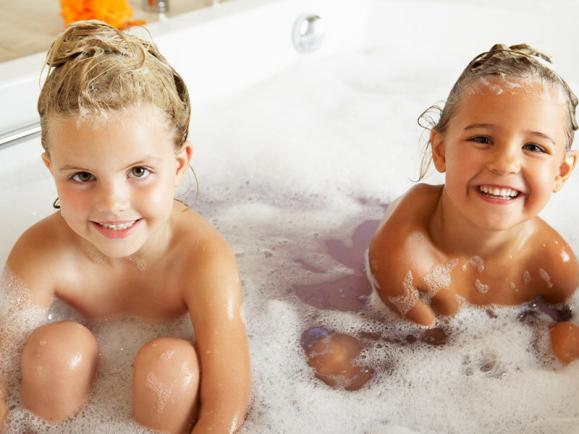
Rub-a-dub, time to scrub! Bath time rituals are a part of many family homes. It's a great time for siblings to bond with their parents, have fun splashing around, and also learn about hygiene at the same time. Plus, bathing siblings together is a great time-saving trick parents have been relying on since the dawn of time.
But at what age does bath time need to be done separately?
This was a topic of intense debate on a recent Reddit post. An anonymous dad said that he was uncomfortable letting his twin 11-year-old boy and girl twins bathe together still, however, the mom completely disagreed. The dad acknowledged that they were too close to puberty for his comfort while the mom said, "They've been doing it their whole life, they're just kids, etc, what's the problem with it?" The mom warned the father of sexualizing their children. People on the post didn't hold back. Some were clearly against the practice, while others said people were making a big deal out of nothing.
“Generally, a good age to stop bathing siblings of different genders [together] is 4 years old,” says Dr. Fran Walfish, Beverly Hills child, parenting and relationship psychotherapist, author of The Self-Aware Parent and co-star of Sex Box on WE tv. “If one of the siblings under the age of 4 demonstrates heightened curiosity by reaching out and touching the [genitles or other sensitive parts] of his or her sibling, that is a direct timing cue for parents to bathe the children separately.”
Walfish also says to handle the separation "matter-of-factly", so that children aren't left feeling confused or ashamed of their bodies. Additionally, you want to ensure they don't see a negative connotation with curiosity or exploration of their own bodies. Toddlers as young as 24 months start noticing how their bodies are similar, or different, to others.
“Learning about their own bodies and sexuality is absolutely normal and a healthy part of child development,” Walfish says.
Dr. Jenn Berman, however, thinks seven might be a more appropriate number. In an article, she wrote: "Generally siblings of opposite genders should start bathing separately around the age of seven or whenever they start grabbing at each other, becoming preoccupied with each other's genitals during bath time, or one asks for privacy." She noted that this was for all-around safety of the children.
Dr. Sanam Hafeez, clinical director of Comprehensive Consultation Psychological Services, agrees. She stated that most children transition out of bathing together before grade school and some even make the choice on their own without parental interference. She suggests it should never be forced, however as children become aware of the physiological and biological changes their bodies will go through bathing should stop.
"This should be a natural transition and attention should not be drawn to it in a forced or unusual manner,” Hafeez says. “This can disrupt sibling relationships as well as impact gender perception as well as of one’s own body.”
How much of this, though, is only weird because of parents' projections? Bath time can start to feel awkward as children grow older regardless of sex or their relationship. However, for Dr. Elizabeth Murray, a pediatric emergency physician and spokesperson for the American Academy of Pediatrics, says bath time only becomes strange when the children think it's weird. When given the chance, children will express any discomfort.
“Kids will develop their own modesty at different levels,” explains Murray. “Some four or five-year-olds feel very strongly about privacy and some kids don’t care about it until they are eight or nine years old.”
The founder and president of Socratic Parenting and the author of "A Simple Guide to Socratic Parenting" encourage families to set healthy boundaries about personal body space as soon as children begin learning language.
“This includes using the correct names for all visible body parts, talking about what they’re used for and identifying which ones are ‘private,’” Gray says. ”Families have different comfort levels when it comes to nudity in the privacy of the home. Avoiding anything that might cultivate shame, parents need to respect their children’s body privacy once they are fully toilet trained and increasingly able to bathe themselves and attend to their own personal hygiene. This includes requiring/allowing/forbidding siblings to bathe together regardless of gender.”
While there is no clear-cut age that all doctors agree on, one thing for sure is that has to stop eventually. Each family and child will have different levels of comfort, and it's important to talk about it openly and honestly. Err on the side of caution if you aren't sure what to do, and don't be afraid to ask your children how they feel.

